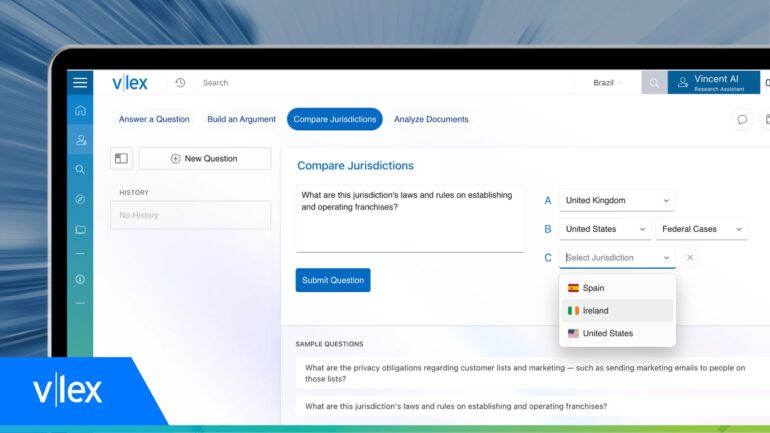TL;DR:
- vLex introduces an innovative suite of language model tools for its AI legal research assistant, Vincent AI.
- The suite enables comprehensive legal research, case building, document summarization, and cross-jurisdictional law comparison.
- Vincent AI integrates OpenAI’s GPT-4, 3.5, and proprietary vLex technology.
- vLex, founded in 2000 in Spain, has expanded globally and merged with Fastcase, offering access to over one billion legal cases and documents from 100+ countries.
- To ensure reliability, Vincent AI sources legal authorities exclusively from vLex’s database.
- Vincent AI provides precise summaries, relevant citations, and confidence scores for user queries.
- The tools are currently available in several countries, with plans for further expansion.
- Eight immediate use cases include answering legal questions, building arguments, comparing laws, spotting legal issues, creating headnote summaries, document search, finding related authorities, and integration with Microsoft Word.
- Vincent AI can analyze laws from different languages and provide summaries in English.
- Pioneering law firms, including David, Graham & Stubbs and Littler, are collaborating with vLex during the beta launch.
Main AI News:
In a bold move, vLex, the esteemed global legal intelligence company, made a significant leap forward on October 17th by introducing a groundbreaking suite of expansive language model tools to augment its AI legal research assistant, Vincent AI. This suite empowers users with the ability to conduct exhaustive searches, construct compelling legal cases, distill document summaries, and scrutinize legal frameworks across diverse jurisdictions. All of this is made possible through vLex’s extensive online global law libraries. Currently, access to this game-changing innovation is by invitation only, aligning with the trend of exclusivity prevalent in this realm. The suite seamlessly integrates OpenAI’s GPT-4, 3.5, and proprietary vLex technology.
Founded in 2000 in Barcelona, Spain, vLex originally set out to serve the Spanish legal market. A pivotal moment arrived in 2019 when vLex acquired Justis, a London-based legal technology company, establishing its London headquarters. More recently, in April of this year, vLex merged with US law library heavyweight Fastcase, exponentially increasing its repository, which now encompasses the legal statutes, regulations, dockets, pleadings, motions, and over one billion cases of over 100 countries.
To counteract the potential hazards associated with unbridled Large Language Models (LLMs), vLex meticulously ensures that Vincent AI sources its legal authorities solely from vLex’s meticulously curated database. Following a natural language query, Vincent provides an impeccably crafted summary along with a direct link to the pertinent citation. Additionally, it highlights the specific portion that directly addresses the inquiry. Crucially, it also imparts a confidence score, offering users a precise gauge of the response’s reliability. In a brief demonstration of this new release, vLex’s VP of Solutions, Damien Riehl, emphasized their unique advantage: “We streamline the process for our users, distinguishing ourselves from competitors who often provide a memorandum and perhaps a case link without pinpointing the specific part of the case that answers the query.”
The enhanced Vincent AI tools are already operational in the United Kingdom, the United States, Ireland, and Spain, offering support in both English and Spanish. Furthermore, plans are in motion to expand to additional jurisdictions on a rolling basis.
For the inaugural beta launch, the vLex team has identified eight immediate use cases, catering to the needs of legal professionals. These include:
- Ask a Question: Generate a research memorandum replete with direct citations and links to credible sources, including Fastcase’s Cert citator in the United States.
- Build an Argument: Vincent will conduct research and assemble arguments either in favor of or against propositions, grounded in precedent from specific jurisdictions. Legal practitioners have the flexibility to add or exclude cases during the analysis, while having access to the relevant source text.
- Compare Law in Different Jurisdictions: Effortlessly compare governing laws across diverse states in the United States or between distinct countries.
- Spot Legal Issues: Efficiently read and summarize the core issues within a case.
- Headnote Summaries: Craft editorial headnotes for a given case.
- Document as a Search: Simply drag and drop a document and automatically discover related precedents, eliminating the need for additional searches.
- Related Authorities: During research, effortlessly locate related authorities from vLex, encompassing primary and secondary materials.
- Vincent for Word: Seamlessly access Vincent AI while drafting documents within Microsoft Word.
A notable feature is Vincent’s ability to perform a comparative analysis, even when examining laws from different language domains. For instance, when tasked with analyzing California law, New York law, UK law, and Spanish law, Vincent delves into Spanish cases, regulations, and secondary sources but compiles the findings into English summaries for the benefit of English-speaking users.
Riehl commented on this distinctive capability: “It will then also provide an English memorandum on the Spanish law. This is something unique in the industry.”
Among the pioneering law firms collaborating with vLex during the beta launch are Denver-based David, Graham & Stubbs, and San Francisco-based Littler.
Chad Ergun, Chief Information Officer at David, Graham & Stubbs, expressed his admiration, stating: “Vincent AI is not merely a new product; it represents a revolutionary departure from the established path of conventional case law providers. In the dynamic and ever-expanding landscape of GenAI, we seek not only innovation but also uncharted perspectives. Vincent AI may well be the fresh perspective the industry has been eagerly anticipating. I am thoroughly impressed.”
Conclusion:
vLex’s introduction of cutting-edge legal research tools signifies a major advancement in the legal tech market. By combining advanced AI technology with a wealth of legal content, vLex is empowering legal professionals to streamline their research, offering precision, efficiency, and a unique capability to compare laws across different languages. This development is set to reshape how legal research is conducted and underscores the importance of innovation in the legal tech industry.

